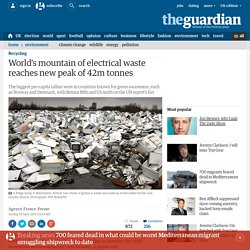

Alex Lin Helps Reduce E-Waste⎢TakePart TV. Piles of thrown-out TVs, laptops and phones pose an environmental risk. Christmas gifts from past years meet a sad end at Absolute Green Electronics Recycling in California.
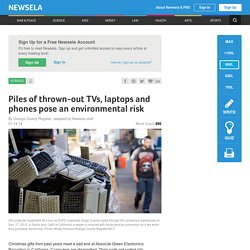
Computers are dismantled. Their parts get sorted into cardboard bins. One bin holds nothing but hard drives. Another holds AC adapters. Bins stretch in rows across a huge warehouse. Stacked-up printers form a miniature mountain. “There are different grades of boards,” said owner and president Victor Kianipay, stepping past dust-covered TVs to poke into apple boxes filled with circuit boards. E-Waste A Global Problem.
India's Environment Problem: Disposing Electronic Waste. The high-pitched, nasal call of the neighborhood scrap collector is a familiar weekend sound in most Indian neighborhoods.
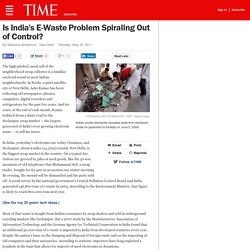
In Noida, a quiet satellite city of New Delhi, Ashu Kumar has been collecting old newspapers, phones, computers, digital recorders and refrigerators for the past five years. And for years, at the end of each month, Kumar trekked down a dusty road to the Seelampur scrap market — the largest graveyard of India's ever growing electronic waste — to sell his wares. In India, yesterday's electronics are today's business, and Seelampur, about 9 miles (14.5 km) outside New Delhi, is the biggest scrap market in the country. On a typical day, visitors are greeted by piles of used goods, like the 50-ton mountain of old telephones that Mohammad Arif, a scrap trader, bought for $2,500 at an auction one winter morning. By evening, the mound will be dismantled and the parts sold off. A few yards from Arif's stall, Seelampur begins in earnest. High-Tech Trash. June is the wet season in Ghana, but here in Accra, the capital, the morning rain has ceased.
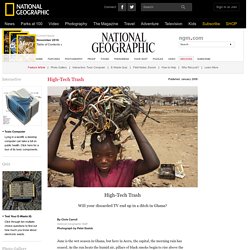
As the sun heats the humid air, pillars of black smoke begin to rise above the vast Agbogbloshie Market. I follow one plume toward its source, past lettuce and plantain vendors, past stalls of used tires, and through a clanging scrap market where hunched men bash on old alternators and engine blocks. Soon the muddy track is flanked by piles of old TVs, gutted computer cases, and smashed monitors heaped ten feet (three meters) high. Beyond lies a field of fine ash speckled with glints of amber and green—the sharp broken bits of circuit boards. I can see now that the smoke issues not from one fire, but from many small blazes. Choking, I pull my shirt over my nose and approach a boy of about 15, his thin frame wreathed in smoke.
People have always been proficient at making trash. Computers are hardly the only electronic hardware hounded by obsolescence. So what happens to all this junk? Radioactive leaks found at 75% of US nuke sites. Steam rises from cooling towers at Exelon Corp.'s nuclear plant in Byron, Ill., March 16, 2011.
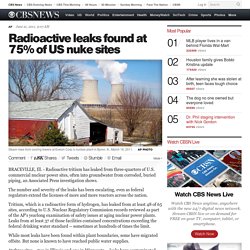
AP Photo. E-waste: The Environmental Crisis You've Never Heard Of. The E-Waste Crisis In 2008, 60 Minutes ran a piece revealing what actually happens to our old electronics when we throw them away.

In The Wasteland, CBS correspondent Scott Pelley follows the trail of electronic waste (e-waste) all the way to China. There, he finds fields of old computers and TVs from America lit on fire by locals looking to burn away plastics and valuable metals (see pictures below). Pelley also interviews National Resource Defense Council senior scientist Allen Hershkowitz about the rapid increase e-waste. Hershkowitz cites the staggering statistic that Americans throws away 130,000 computers every day.
Well, the short answer is worse. Yet, as eye-catching as these numbers are, the problem of e-waste has largely flown under the radar. As a society, we generally refuse to pay for things to be recycled. But here is the kicker, doing the wrong thing it isn’t actually free, and doing the right thing doesn’t have to be costly. This is where GreenCitizen steps in. Electronic waste. Defective and obsolete electronic equipment.
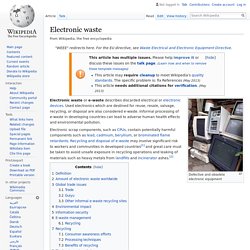
E-Waste - Connecticut. "We have forgotten how to be good guests, how to walk lightly on the earth as its other creatures do.

" ~ Barbara Ward, Only One Earth, 1972 From the mining of the raw materials to the recycling or disposal of our electronic products, electronics have a significant impact on the environment. By considering the environment when you purchase, use and dispose of a computer, television, or other electronic device, you can conserve energy, help the environment and save money.
Related Topics Why Recycle Electronics? Computers and televisions are only part of the consumer electronics waste stream which also includes VCRs, radios, cell phones, and small appliances. Careful disposal of these items is important because many electronic products contain hazardous components. World's mountain of electrical waste reaches new peak of 42m tonnes. A record amount of electrical and electronic waste was discarded around the world in 2014, with the biggest per-capita tallies in countries that pride themselves on environmental consciousness, a report said.
